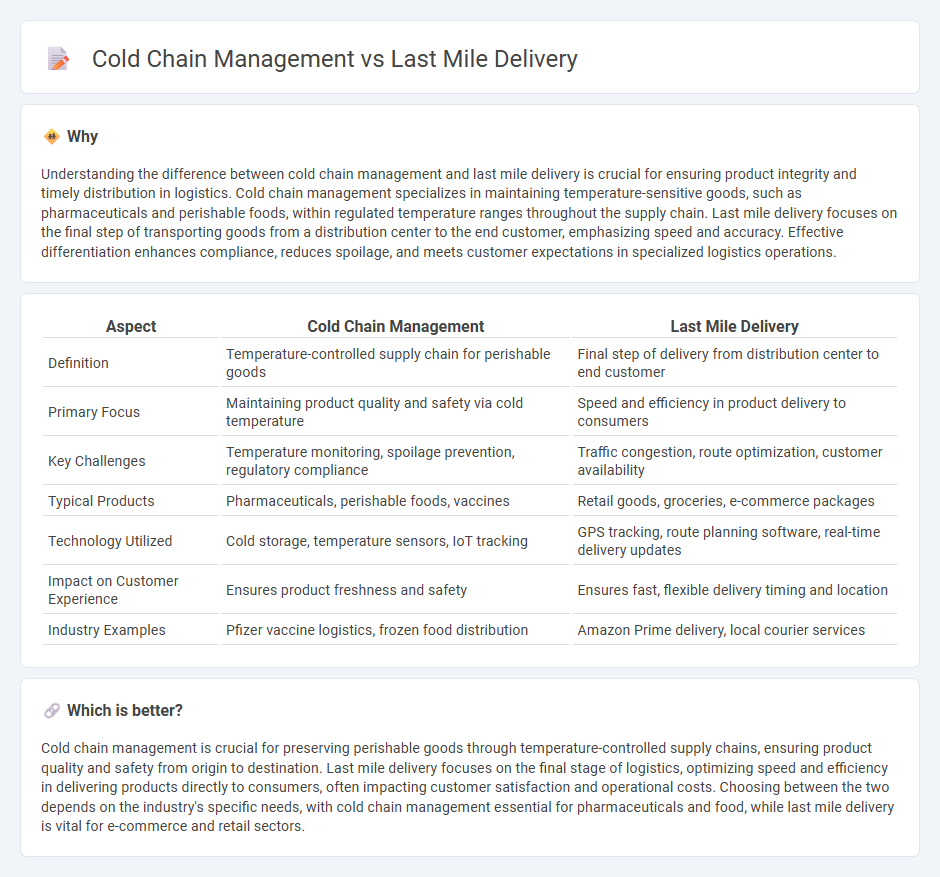
Cold chain management focuses on maintaining temperature-sensitive products like pharmaceuticals and perishable foods throughout the supply chain to ensure safety and quality. Last mile delivery emphasizes the final step of the supply process, prioritizing speed and accuracy to meet customer demands in urban and rural areas. Explore how these logistics strategies optimize efficiency and customer satisfaction in diverse industries.
Why it is important
Understanding the difference between cold chain management and last mile delivery is crucial for ensuring product integrity and timely distribution in logistics. Cold chain management specializes in maintaining temperature-sensitive goods, such as pharmaceuticals and perishable foods, within regulated temperature ranges throughout the supply chain. Last mile delivery focuses on the final step of transporting goods from a distribution center to the end customer, emphasizing speed and accuracy. Effective differentiation enhances compliance, reduces spoilage, and meets customer expectations in specialized logistics operations.
Comparison Table
| Aspect | Cold Chain Management | Last Mile Delivery |
|---|---|---|
| Definition | Temperature-controlled supply chain for perishable goods | Final step of delivery from distribution center to end customer |
| Primary Focus | Maintaining product quality and safety via cold temperature | Speed and efficiency in product delivery to consumers |
| Key Challenges | Temperature monitoring, spoilage prevention, regulatory compliance | Traffic congestion, route optimization, customer availability |
| Typical Products | Pharmaceuticals, perishable foods, vaccines | Retail goods, groceries, e-commerce packages |
| Technology Utilized | Cold storage, temperature sensors, IoT tracking | GPS tracking, route planning software, real-time delivery updates |
| Impact on Customer Experience | Ensures product freshness and safety | Ensures fast, flexible delivery timing and location |
| Industry Examples | Pfizer vaccine logistics, frozen food distribution | Amazon Prime delivery, local courier services |
Which is better?
Cold chain management is crucial for preserving perishable goods through temperature-controlled supply chains, ensuring product quality and safety from origin to destination. Last mile delivery focuses on the final stage of logistics, optimizing speed and efficiency in delivering products directly to consumers, often impacting customer satisfaction and operational costs. Choosing between the two depends on the industry's specific needs, with cold chain management essential for pharmaceuticals and food, while last mile delivery is vital for e-commerce and retail sectors.
Connection
Cold chain management ensures the temperature-controlled supply of perishable goods, maintaining product quality and safety from origin to destination. Last mile delivery plays a crucial role in this process by providing timely, precise transportation to end consumers, minimizing exposure to temperature fluctuations. Efficient integration of cold chain logistics with last mile delivery systems reduces spoilage, enhances customer satisfaction, and supports compliance with regulatory standards.
Key Terms
**Last Mile Delivery:**
Last mile delivery emphasizes the final step in the supply chain, ensuring products reach customers quickly and efficiently, often within urban areas and tight timeframes. It involves complex logistics, real-time tracking, and optimized route planning to reduce delivery costs and enhance customer satisfaction. Explore how advanced last mile delivery solutions are transforming the e-commerce and retail sectors.
Route Optimization
Route optimization in last mile delivery enhances efficiency by minimizing travel time and fuel consumption, ensuring faster package arrivals to end customers. In cold chain management, route optimization is crucial for maintaining temperature-sensitive products' integrity by reducing transit time and avoiding delays. Explore advanced route optimization techniques to improve both delivery speed and product quality in these logistics processes.
Proof of Delivery
Last mile delivery emphasizes timely and accurate Proof of Delivery (POD) to confirm successful customer receipt, while cold chain management integrates POD with temperature monitoring to ensure product integrity for perishable goods. Both processes utilize digital signatures, GPS tracking, and real-time updates, but cold chain management adds compliance with regulatory standards for handling sensitive items like pharmaceuticals and fresh food. Explore how advanced POD technologies enhance reliability and transparency in both last mile delivery and cold chain operations.
Source and External Links
Last mile delivery: solutions for your business - Last mile delivery is the final step of moving goods from a local distribution center to the end consumer, aiming for fast, affordable, and accurate delivery through various methods including vans, bikes, and experimental robots and drones, with significant focus on speed, reliability, and customer interaction.
How it Works, Benefits, & How to Fulfill with Last-Mile Carriers - Last-mile delivery refers to the transportation of a package from a fulfillment center to the final destination, usually a personal residence, with last-mile carriers focused on cost-effective, quick delivery and providing real-time tracking to enhance customer satisfaction.
Last-mile delivery: What it is and why it matters for retailers - Last-mile delivery is the last phase of the shipping process and crucial for customer satisfaction, involving moving products from a warehouse or distribution center directly to the customer's doorstep, with fast delivery increasing sales, convenience, and operational efficiency despite being costly and time-consuming.
 dowidth.com
dowidth.com